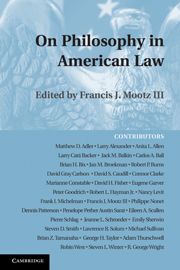Book contents
- Frontmatter
- Contents
- Introduction
- PART I KARL LLEWELLYN AND THE COURSE OF PHILOSOPHY IN AMERICAN LAW
- PART II PHILOSOPHICAL PERSPECTIVES ON LAW
- PART III AREAS OF PHILOSOPHY AND THEIR RELATIONSHIP TO LAW
- PART IV PHILOSOPHICAL EXAMINATIONS OF LEGAL ISSUES
- 18 Law as Premise
- 19 Doing Justice to Justice: Paul Ricoeur
- 20 Love Is All You Need: Freedom of Thought versus Freedom of Action
- 21 Legal Philosophy over the Next Century (While We Wait for the Personal Rocket Transportation We Were Promised)
- 22 Atmospherics: Abortion Law and Philosophy
- PART V LAW, RHETORIC, AND PRACTICE THEORY
- PART VI QUESTIONING THE RELATIONSHIP BETWEEN PHILOSOPHY AND AMERICAN LAW
- PART VII COMMENTARIES
- Contributors and Selected Bibliography
- Name Index
- References
20 - Love Is All You Need: Freedom of Thought versus Freedom of Action
Published online by Cambridge University Press: 31 July 2009
- Frontmatter
- Contents
- Introduction
- PART I KARL LLEWELLYN AND THE COURSE OF PHILOSOPHY IN AMERICAN LAW
- PART II PHILOSOPHICAL PERSPECTIVES ON LAW
- PART III AREAS OF PHILOSOPHY AND THEIR RELATIONSHIP TO LAW
- PART IV PHILOSOPHICAL EXAMINATIONS OF LEGAL ISSUES
- 18 Law as Premise
- 19 Doing Justice to Justice: Paul Ricoeur
- 20 Love Is All You Need: Freedom of Thought versus Freedom of Action
- 21 Legal Philosophy over the Next Century (While We Wait for the Personal Rocket Transportation We Were Promised)
- 22 Atmospherics: Abortion Law and Philosophy
- PART V LAW, RHETORIC, AND PRACTICE THEORY
- PART VI QUESTIONING THE RELATIONSHIP BETWEEN PHILOSOPHY AND AMERICAN LAW
- PART VII COMMENTARIES
- Contributors and Selected Bibliography
- Name Index
- References
Summary
Why should we give greater freedom to thought, speech, and expression than to actions? Speech can cause as much harm as action, and yet just because speech causes damage is not by itself a sufficient reason to prevent it. If I persuade large numbers of people that condoms don't work, and they then don't use them, I cause harm but would be guilty of no crime. If I infiltrate a condom factory and reset the machines so that the condoms' failure rate increases to match the claims that condoms don't work, I not only do harm but also can be prosecuted for the injuries I cause to others. Hume (1816: 48) refers to the “paradoxical principle and salutary practice of toleration”; I would like to strengthen the practice by making its principle appear as paradoxical as it should.
A great deal of political and moral theory of the past three hundred years has been devoted to supplying new understandings of fundamental moral and political ideas once their original religious underpinnings are no longer credible. Thus Mill (1977, 217) begins On Liberty by distinguishing his subject, civil and political liberty, from “so-called ‘freedom of the will.’” By his time, free will had become a metaphysical fiction no longer connected to sin, grace, and salvation, but it left in its train live, practical issues about civil and political freedom. The separation of power over thought and expression from power over actions originated in the battle for freedom of religious conscience.
- Type
- Chapter
- Information
- On Philosophy in American Law , pp. 167 - 175Publisher: Cambridge University PressPrint publication year: 2009



